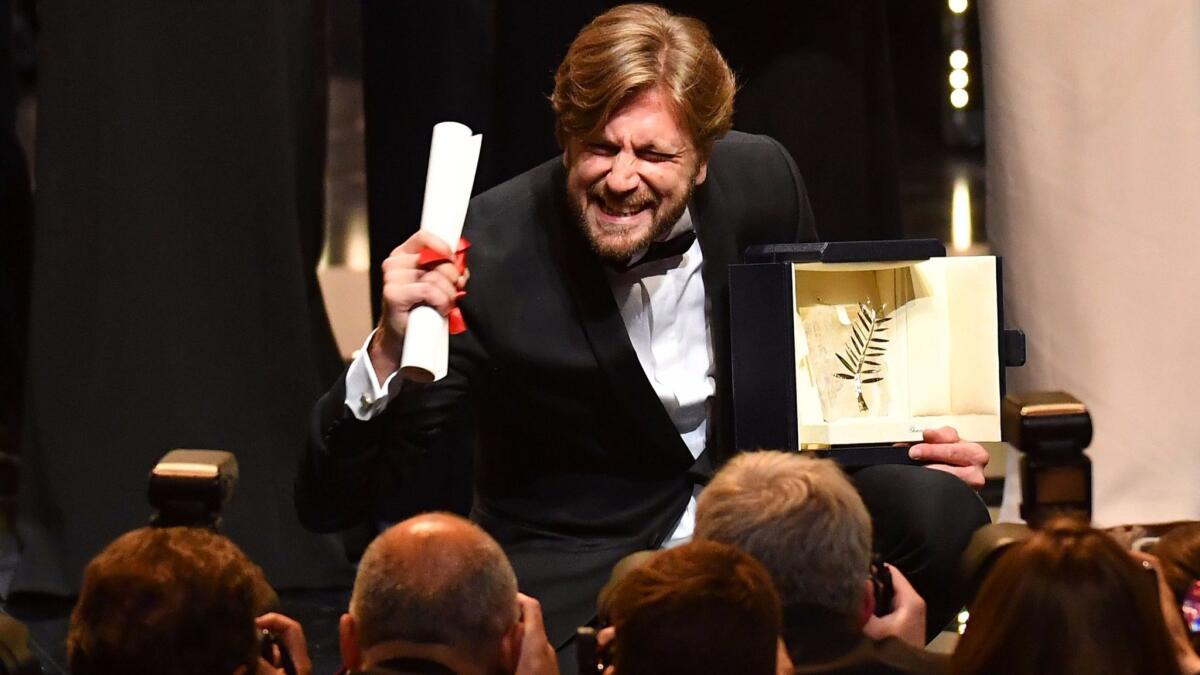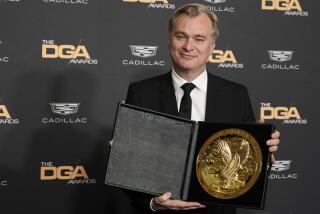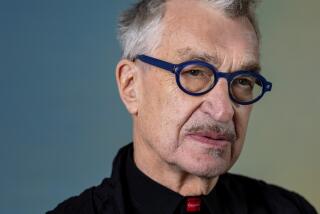Cannes 2017: Ruben Östlund’s ‘The Square’ wins the Palme d’Or

At a Cannes Film Festival where the purposes and parameters of art have been much debated, with Netflix, virtual reality and television series making rare and sometimes first-time appearances, it was only fitting that the Palme d’Or was awarded Sunday night to “The Square,” Swedish director Ruben Östlund’s blisteringly funny and provocative portrait of a modern-art museum curator enduring a crisis of conscience.
Thanking one of his collaborators in his acceptance speech, Östlund said, “We made a film that is 2 1/2 hours, and I think you’re the only producer who said, after the screening last Sunday, ‘We have to make the film longer!’”
At the end of his speech, he directed the audience at the Palais des Festivals to join him in a collective “primal scream of happiness,” with which they gladly complied.
“The Square,” which was announced in late April as a last-minute addition to the competition, drew a broad but largely favorable range of reactions when it premiered over the festival’s first weekend. Starring Claes Bang and Elisabeth Moss, it will be released in the U.S. by Magnolia Pictures.
Östlund came to international prominence at Cannes with his 2014 drama, “Force Majeure,” which premiered in the festival’s out-of-competition Un Certain Regard sidebar.
A similarly long and sprawling entry, Robin Campillo’s “120 Beats per Minute” (“120 Battements par Minute”), won the Grand Prix, the runner-up to the Palme. A moving tribute to the Paris wing of the AIDS activist group ACT UP in the ’90s, inspired by Campillo’s own experience, the film was one of the competition’s most well-received titles. The Orchard acquired U.S. distribution rights shortly after the film’s premiere.
Eleven years after drawing a few boos and zero prizes for her competition entry “Marie Antoinette,” Sofia Coppola won directing honors for “The Beguiled,” her slyly feminist adaptation of a Civil War-era novel that previously inspired Don Siegel’s 1971 thriller starring Clint Eastwood. The new film, a Focus Features release, has a mostly female cast led by Nicole Kidman, Kirsten Dunst and Elle Fanning.
While the jury emphasized at a post-ceremony press conference that the award to Coppola was given for artistic reasons rather than political ones, juror Jessica Chastain noted that, with a few exceptions, she had found some of the films’ representations of women “quite disturbing, to be honest.”
“I do hope that when we include more female storytellers we will have more of the women that I recognize in my day-to-day life — ones that are proactive, have their own agency, and don’t just react to the men around them,” she said.
Coppola wasn’t present at the ceremony but sent a video acceptance speech in which she reserved her final thanks to “Jane Campion for being a role model and supporting women filmmakers.” Campion remains the sole filmmaker to win Cannes’ highest honor in its 70-year history, which she did for “The Piano” (1993).
Elsewhere, the jury, led by Spanish director Pedro Almodóvar, spread the wealth around, though its members did bestow two awards on one film in particular. Joaquin Phoenix received the actor prize for his performance as a schlubby, severely troubled hit man in Scottish writer-director Lynne Ramsay’s stylish and violent crime thriller “You Were Never Really Here,” an Amazon Studios production.
“This is totally unexpected, as you can see from my shoes,” Phoenix said on stage, indicating the sneakers he was wearing along with his tuxedo.
“You Were Never Really Here,” an adaptation of a Jonathan Ames novella, shared the screenplay award with A24’s “The Killing of a Sacred Deer,” a nightmarish, darkly funny portrait of an American family in paralytic meltdown written by the Greek director Yorgos Lanthimos and his co-writer Efthimis Filippou. Lanthimos previously scored the Cannes jury prize in 2015 for his surreal satire “The Lobster.”
Diane Kruger received the actress prize for her performance as a woman seeking justice, then revenge, for the deaths of her loved ones in a terrorist attack in “In the Fade,” a drama from the German Turkish director Fatih Akin.
“I cannot accept this award without thinking of anyone who has ever been affected by an act of terrorism and who is trying to pick up the pieces and go on living,” Kruger said in her speech. “Please know that you’re not forgotten.”
Not to be left out was Kidman, very much the face of Cannes this year with four different projects on the Croisette (“The Beguiled,” “The Killing of a Sacred Deer,” “Top of the Lake: China Girl” and “How to Talk to Girls at Parties”). She received a special 70th anniversary prize, which she accepted from afar in a prerecorded speech.
One of the most powerful entries in competition had to settle for the jury prize, effectively third place: “Loveless” (“Nelyubov”), a bleak drama about a couple’s divorce that morphs into a brutal indictment of modern-day Russia. The film was acquired by Sony Pictures Classics during the festival.
Delivering his speech in Russian, director Andrey Zvyagintsev thanked the jury for the honor, singling out Will Smith: “He really exists.”
Besides Almodóvar, Chastain and Smith, the other members of the competition jury were German writer-director Maren Ade, Chinese star Fan Bingbing, French actress and filmmaker Agnès Jaoui, South Korean filmmaker Park Chan-wook, Italian writer-director Paolo Sorrentino and French composer Gabriel Yared.
Toward the beginning of the festival, Almodóvar and Smith had a polite but sharp exchange over the presence of two Netflix films in competition, which has spurred much debate over what it means for the future of the festival and film distribution.
While Almodóvar, a champion of the theatrical experience, made clear that the Netflix titles, Bong Joon-ho’s “Okja” and Noah Baumbach’s “The Meyerowitz Stories (New and Selected),” would be given fair treatment, neither of them won a prize. By contrast, Netflix’s more theatrical-friendly rival Amazon Studios came away with two awards for “You Were Never Really Here.”
A separate jury awarded the Camera d’Or, presented to a debut feature playing in any section of the festival, to “Jeune Femme,” French writer-director Léonor Serraille’s study of a broke young woman returning to Paris after a long absence.
As always, some of the strongest films in Cannes could be found outside the main competition, and a few of them duly won prizes from their respective juries. In the festival’s Un Certain Regard sidebar, the Uma Thurman-led jury gave its top prize to Mohammad Rasoulof’s “A Man of Integrity” (“Lerd”), a somber, scorching look at corruption in the director’s native Iran.
Other Un Certain Regard highlights included the Sundance-premiered “Wind River,” a Jeremy Renner-Elizabeth Olsen wilderness thriller that won Taylor Sheridan the jury’s directing prize, and “The Workshop” (“L’Atelier”), a tense, absorbing look at teacher-student dynamics that represents the French director Laurent Cantet’s strongest and most characteristic work since his Palme d’Or-winning “The Class” (2008).
Michel Franco, whose “Chronic” won a screenplay prize in the main competition two years ago,” received the Certain Regard jury prize for his latest, the family drama “April’s Daughters” (“Hijas de Abril”).
Over in Directors’ Fortnight, a concurrent program separate from the official selection, the top prize, the Art Cinema Award, went to “The Rider,” a portrait of a South Dakota rodeo star facing a difficult life decision. Directed with stirring beauty and lyricism by the Chinese American filmmaker Chloé Zhao, the film was acquired for North American distribution by Sony Pictures Classics during the festival.
Another Fortnight title that drew some of the festival’s most rapturous notices was “The Florida Project,” a terrifically immersive work of child’s-eye realism set in a run-down motel on the outskirts of Orlando, Fla. Directed by Sean Baker (“Tangerine”), the movie won no prizes but many hearts, as well as a distribution deal with A24.
The Fortnight’s Europa Cinema Labels Award went to “A Ciambra,” a migrant drama directed by the U.S.-born, Italy-based filmmaker Jonas Carpignano and produced by Martin Scorsese, underscoring the strong contingent of festival films addressing themes of immigration and the refugee crisis.
One that may or may not belong in that category, depending on how you define it, is Alejandro G. Iñárritu’s “Carne y Arena,” a virtual-reality installation that became one of the festival’s hottest tickets.
Sharing honors from the Society Dramatic Authors and Composers, given annually to a French film in Fortnight, were two very different tales of romantic possibility in Paris: Philippe Garrel’s black-and-white “Lover for a Day” (“L’Amant d’un Jour”), about a 23-year-old woman who learns that her father is dating a girl her age, and Claire Denis’ “Let the Sunshine In” (“Un Beau Soleil Intérieur”), starring Juliette Binoche as a divorced artist looking for love in many of the wrong places.
The latter was among the festival’s most roundly admired titles and had many wondering, not for the first time, why the well-regarded Denis was not in competition.
In Critics’ Week, a program devoted to the discovery of new talent, the top prize, the Nespresso Grand Prix, went to “Makala,” Emmanuel Gras’ documentary about a young Congolese man trying to make a living by producing charcoal. “Gabriel and the Mountain,” Brazilian director Fellipe Barbosa’s fact-inspired drama about a friend’s ill-fated trip to Africa, won the France 4 Visionary Award.
More to Read
Only good movies
Get the Indie Focus newsletter, Mark Olsen's weekly guide to the world of cinema.
You may occasionally receive promotional content from the Los Angeles Times.







